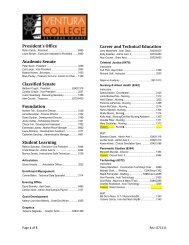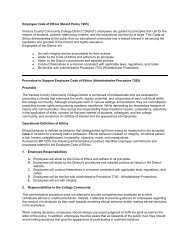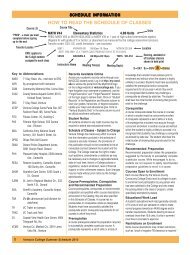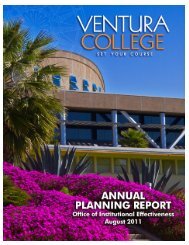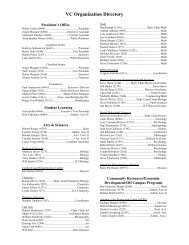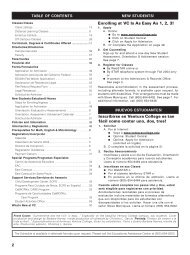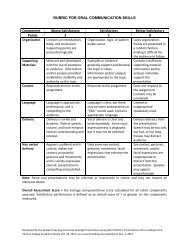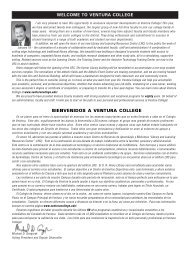2011 General CataloG & announCement of Courses - Ventura College
2011 General CataloG & announCement of Courses - Ventura College
2011 General CataloG & announCement of Courses - Ventura College
Create successful ePaper yourself
Turn your PDF publications into a flip-book with our unique Google optimized e-Paper software.
CJ V02 - CONCEPTS OF CRIMINAL LAW - 3 Units<br />
Recommended preparation: ENGL V01A<br />
Hours: 3 lecture weekly<br />
This course <strong>of</strong>fers an overview <strong>of</strong> the historical development,<br />
philosophy, and content <strong>of</strong> California and federal criminal law and<br />
constitutional provisions. This course reviews constitutional rights,<br />
definitions, classification <strong>of</strong> crimes, elements <strong>of</strong> criminal <strong>of</strong>fenses,<br />
and their application to the criminal justice system. Legal research,<br />
methodology, and concepts <strong>of</strong> law as a social, religious and<br />
historical force will be examined. California statutes related to laws<br />
<strong>of</strong> arrest, crimes against persons, and crimes involving property are<br />
explored in detail. Case law and current media reports will be utilized<br />
to enhance the students’ understanding <strong>of</strong> criminal law.<br />
Field trips will be required. Formerly CJ V02A. Transfer credit:<br />
CSU; UC.<br />
CJ V03 - COMMUNITY RELATIONS AND DIVERSITY - 3 Units<br />
Hours: 3 lecture weekly<br />
Students will explore the roles <strong>of</strong> practitioners in the criminal<br />
justice field. Through discussion and study the students will review<br />
the expectations and perceptions <strong>of</strong> the public. Principal emphasis<br />
will be placed on community-oriented policing, discretionary<br />
decision making, the use <strong>of</strong> authority, along with communications<br />
and crisis management by persons working in the criminal justice<br />
system. Students will explore the complex relationship between the<br />
community and the justice system with emphasis on the challenges<br />
<strong>of</strong> dealing with the role <strong>of</strong> race, ethnicity, gender, sexual orientation,<br />
social class, language, and culture in shaping these relations.<br />
Field trips may be required. Formerly CJ 3. Transfer credit: CSU;<br />
UC.<br />
CJ V04 - LEGAL ASPECTS OF EVIDENCE - 3 Units<br />
Recommended preparation: CJ V02<br />
Hours: 3 lecture weekly<br />
This course will review the structure <strong>of</strong> the California Evidence<br />
Code, its procedures and rules as they apply to the admissibility<br />
<strong>of</strong> evidence in criminal proceedings. Emphasis will be placed on<br />
review <strong>of</strong> statutes and case law in the areas <strong>of</strong> search and seizure,<br />
witnesses’ confessions and admissions, and presentation <strong>of</strong><br />
evidence.<br />
Field trips may be required. Formerly CJ 4. Transfer credit: CSU.<br />
CJ V05 - CRIMINAL PROCEDURES - 3 Units<br />
Hours: 3 lecture weekly<br />
Students will review and discuss legal processes from prearrest,<br />
arrest through trial, sentencing, and correctional procedures.<br />
A review <strong>of</strong> the history <strong>of</strong> case and common law and conceptual<br />
interpretations <strong>of</strong> law as reflected in court decisions will be<br />
discussed. The course will use case law methodology and research<br />
to review the impact these decisions have had on the justice system.<br />
Field trips may be required. Formerly CJ 5. Transfer credit: CSU.<br />
CJ V06 - CRIMINAL JUSTICE REPORT WRITING - 3 Units<br />
Recommended preparation: CJ V02 or CJ V04 or ENGL V02<br />
Hours: 3 lecture weekly<br />
This course covers report writing for criminal justice practitioners.<br />
Emphasis will be on mastering report writing to record crime scenes,<br />
emergency response situations and routine occurrences. The goal <strong>of</strong><br />
this course is to help the student learn how to translate observations<br />
into a succinct, yet comprehensive, document for court presentation.<br />
Focus will also be placed on the importance <strong>of</strong> information gathering<br />
techniques, and thorough, accurate, and well-written report writing,<br />
not only as a reflection <strong>of</strong> pr<strong>of</strong>essionalism, but also to ensure the<br />
ability <strong>of</strong> the justice system to prosecute the criminal case.<br />
Field trips may be required. Formerly CJ 6. Transfer credit: CSU.<br />
CJ V07 - PATROL PROCEDURES - 3 Units<br />
Hours: 3 lecture weekly<br />
This course presents the responsibilities, techniques and methods<br />
<strong>of</strong> police patrol. It meets the objectives required by the California<br />
Commission <strong>of</strong> Peace Officer Standards and Training.<br />
Field trips may be required. Formerly CJ 7. Transfer credit: CSU.<br />
CJ V08 - CRIMINAL INVESTIGATION - 3 Units<br />
Hours: 3 lecture weekly<br />
This course stresses the fundamentals <strong>of</strong> criminal investigation.<br />
Topics include collection and preservation <strong>of</strong> evidence, scientific<br />
aids, modus operandi, sources <strong>of</strong> information, interviewing and<br />
interrogation techniques, follow-up and case preparation, criminal<br />
pr<strong>of</strong>iling, crime scene sketching, fingerprint analysis, and D.N.A. A<br />
brief history <strong>of</strong> criminal investigation precedes the main course <strong>of</strong><br />
instruction.<br />
Field trips may be required. Formerly CJ 8. Transfer credit: CSU.<br />
CJ V11 - AIKIDO - 1-1.5 Units<br />
Hours: .5-1 lecture, 1.5-2 laboratory weekly<br />
Aikido is a powerful martial art developed in Japan by Morihei<br />
Veshiba. Through the study <strong>of</strong> principles and theory <strong>of</strong> ancient<br />
fighting methods, Veshiba was able to develop a method <strong>of</strong> nonresistive<br />
and noncompetitive technique. The practice <strong>of</strong> Aikido<br />
includes warm-up and flexibility exercises, practical combative and<br />
defensible techniques combined with an appreciation for formal<br />
etiquette. Students will develop a greater understanding <strong>of</strong> the<br />
relationship between mind, body and spirit that will help them deal<br />
with both physical and mental conflict in a more positive way.<br />
Field trips may be required. CJ V11/PE V32 may be taken in any<br />
combination for a maximum <strong>of</strong> 4 times. Formerly CJ 11. Same as PE<br />
V32. Transfer credit: CSU; UC; credit limitations - see counselor.<br />
CJ V12A - DEFENSIVE TACTICS: JU JITSU - 1-1.5 Units<br />
Hours: .5-1 lecture, 1.5-2 laboratory weekly<br />
This is a self-defense course for the peace <strong>of</strong>ficer and civilian. It<br />
is designed to provide instruction in the simplest and most effective<br />
methods for neutralizing and controlling an attacker or suspect.<br />
Emphasis will be placed on Ju Jitsu techniques that do not require<br />
upper body strength.<br />
Field trips may be required. CJ V12A, V12B/PE V33, V34 may be<br />
taken in any combination for a maximum <strong>of</strong> 4 times. Formerly CJ<br />
12A. Same as PE V33. Transfer credit: CSU; UC; credit limitations -<br />
see counselor.<br />
CJ V12B - INTERMEDIATE JU JITSU - 1-1.5 Units<br />
Prerequisite: CJ V12A or PE V33<br />
Hours: .5-1 lecture, 1.5-2 laboratory weekly<br />
This is a self-defense course for students desiring to develop<br />
intermediate-level skills in Ju Jitsu.<br />
Field trips may be required. CJ V12A, V12B/PE V33, V34 may be<br />
taken in any combination for a maximum <strong>of</strong> 4 times. Formerly CJ<br />
12B. Same as PE V34. Transfer credit: CSU; UC; credit limitations -<br />
see counselor.<br />
CJ V14 - JUVENILE LAW AND PROCEDURES IN<br />
CALIFORNIA - 3 Units<br />
Hours: 3 lecture weekly<br />
This course will <strong>of</strong>fer an overview <strong>of</strong> the juvenile justice system<br />
in California, including the history <strong>of</strong> juvenile law and current police<br />
and probation procedures. Theories on delinquency causes and<br />
treatments will be discussed as an avenue toward understanding the<br />
juvenile <strong>of</strong>fender. Child abuse/neglect and crimes against children,<br />
including sex crimes, will also be covered.<br />
Field trips will be required. Formerly CJ 14. Transfer credit: CSU.<br />
122 Credit <strong>Courses</strong>, Degrees, Certificates, and Awards <strong>Ventura</strong> <strong>College</strong> Catalog 2010 - <strong>2011</strong>



